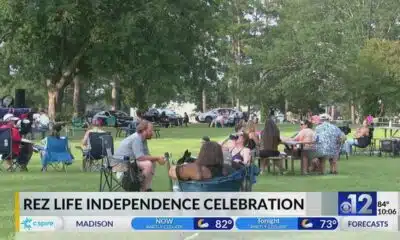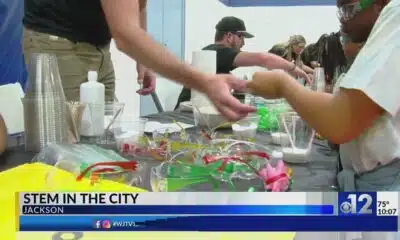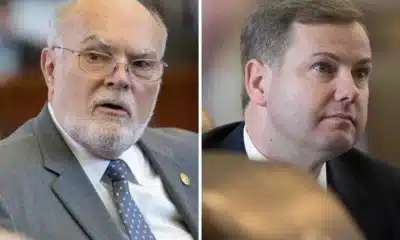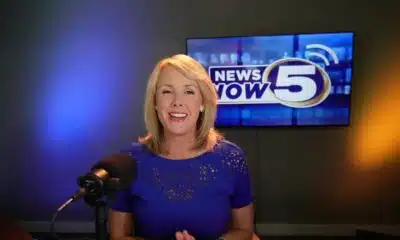Mississippi Today
Reddit AMA recap: Medicaid expansion in Mississippi with Senior Political Reporter Geoff Pender
Reddit AMA recap: Medicaid expansion in Mississippi with Senior Political Reporter Geoff Pender
Mississippi's growing health crisis threatens to close at least a dozen hospitals across the state and puts Mississippi in the lead nationally for rates of uninsured people.
Studies have shown and advocates have long touted the benefits of Medicaid expansion, but state leaders remain steadfast in their opposition. As such, Mississippi remains one of only 11 states in the country not to expand the federal-state program.
Mississippi Today launched an ongoing series looking at the impact of the health care crisis on the people and institutions of the state.
As part of that project, Senior Political Reporter Geoff Pender answered readers' questions on Reddit about Medicaid expansion (or the lack thereof) in the state. Here's a recap:
Click to jump to a specific question
Q: Thank you for doing this and continuing to push on this topic.
As I sit here seeing the Greenwood hospital closing while the governor touts tax breaks for companies and the state government refuses this aid… I just do not get it.
Unless I think of all of the non-rational reasons for it.
A: Unfortunately, we are hearing from many corners that Greenwood may be the canary in the coal mine right now. We have heard some dire predictions of late from state hospital and other officials. State Health Officer Dr. Edney recently warned that we're looking at at least half a dozen hospitals on the brink, and others are saying our entire system is troubled. I don't know that Medicaid expansion would be the panacea for all that, but most experts are saying the influx of billions of federal dollars for health care would stave off many of these problems.
Q: As the Q&A article describes, there are political and economic arguments against expansion, but what in your opinion are the underlying motives for the stance? Are the politicians perhaps more driven by financial incentive from opposition groups in addition to maintaining their political platforms for the sake of the party? And as for general people, do you think it’s related to a mentality of being against handouts and of “pulling yourself up by your bootstraps”? What do you think are the underlying feelings and motivations to these stances?
And lastly, how do you think these underlying reasons can be negotiated with to make progress towards achieving expansion?
A: As far as the current drivers of opposition to expansion, I would say they are now more political than economic, and have been so for quite a while. For one thing, we have empirical evidence from other states, including now Louisiana and Arkansas, that show expansion isn’t the budget-buster our leaders once feared.
We also have reams of studies and evidence from other states showing we would see net positive benefits – thousands of jobs created, savings of double-digit percentages in uncompensated care for hospitals, more workforce participation (ours is typically lowest in the country), net GDP growth and even projected growth in population. Also, we’ve seen firsthand over the last two years that Mississippi, with our economy so heavily dependent on federal spending, sees booming state budget growth when there is an influx of billions of federal dollars. We’re sitting on more than $2 billion in basically surplus state money right now, largely the result of the influx of federal pandemic spending.
And again, this expansion is aimed primarily at the “working poor,” people in the gap between being poor enough for other help or being able to afford private insurance or pay medical bills out of pocket. As many have pointed out, a lot of the folks we’re talking about with this are working more than one job. As for pulling one’s self up by bootstraps, too many folks are one ER visit away from not having any bootstraps, and once someone gets a chronic illness because of lack of preventive care, it costs taxpayers anyway (and more).
No, the opposition now would appear to be more purely political (partisan) and philosophical – not wanting expansion of “Obamacare,” and opposition to expansion of a government program, even if in the long run it’s projected to benefit the workforce and private sector.
That opposition to government programs, however, appears to be selective among state leaders. One recent anecdote struck me in particular. Gov. Reeves recently held a press conference to trumpet the state’s work on expanding broadband internet across rural Mississippi. This is being funded with federal tax dollars. Instead of lamenting such government largesse, Reeves vowed to see that “we not only get our fare share, but that we get more than our fair share.” It would appear it’s OK to take hundreds of millions of federal dollars for internet service to areas where the private sector won’t do it, but not OK to take federal money to help keep people alive and well and working.
As for how this opposition might be overcome – I don’t know that anyone has a simple answer to that. One thing I hear all the time, though, even from some who have opposed expansion, is time. I have heard over and again in recent years that it’s probably just a matter of time before Mississippi expands Medicaid. Polling in recent years would indicate the populace may already be a bit ahead of our politicians on this policy … and, of course, look at other states relenting, such as Arkansas, Louisiana.
We attempted to delve into some of this opposition, past and present, here.
READ MORE: Who’s opposed to Mississippi Medicaid expansion and why?
Q: Can Medicaid expansion prevent local hospitals from closing?
A: It's unclear if it definitely would — rural hospitals in particular are facing major headwinds with personnel shortages and costs, supplies, inflation, uncompensated care. But most projections by experts have shown net benefits, and we've seen in other states that expansion helped. Particularly, in Louisiana, rural hospitals saw reductions in uncompensated care costs in the 55% range. This alone could give struggling rural hospitals some breathing room.
This study indicates hospitals in expansion states are less likely to close.
Q: With Medicaid expansion costing far more than initially predicted in other states, it delivering consistently poor health outcomes for those on the program, and it failing to ultimately help save rural providers as seen in Colorado and Indiana…why advocate so intensely for expanding a program that’s heading toward insolvency besides the fact that it will pad the pockets of and expand profits for big hospitals?
A: As for costing more than predicted, as I understand, this has not truly been the case at least on the state level. Some states have seen more people than initially predicted, but that has also been offset by people shifting from their traditional Medicaid to that with the higher match rate from the feds, and other non-direct economic benefits.
As for Colorado, I just recently read a report that rural hospitals there are "about 6 times less likely to close than hospitals in non-expansion states, according to a study by researchers at the University of Colorado Anschutz Medical Campus." I'm not sure what you are looking at, but would like to see it if you can forward a link.
As for poor health outcomes, I'm not sure Mississippi would have anywhere to go but up. Mississippi Medicaid has had poor health outcomes, but that has been primarily because only the sickest of the sick, so to speak, are on its adult population. Proponents say that the working-poor expansion population would receive more preventive care and improve outcomes — but you are right, that has been one major argument against expansion in Mississippi.
I don't know that expansion would pad the pockets and profits of big hospitals. It would help ameliorate the $600 million or so in uncompensated care that is hammering, in particular, smaller rural hospitals.
READ MORE:
• The Mississippi Health Care Crisis
• Mississippi moms and babies suffer disproportionately. Medicaid expansion could help.
• How Medicaid expansion could have saved Tim’s leg — and changed his life
• Q&A: What is Medicaid expansion, really?
This article first appeared on Mississippi Today and is republished here under a Creative Commons license.
Mississippi Today
Mississippi school superintendents indicted on fraud charges
The superintendents for Leake County and Hollandale school districts and a consultant have been indicted on four federal counts of conspiracy to commit embezzlement, theft and bribery.
According to the indictment, Earl Joe Nelson, while superintendent of Clarksdale Municipal School District and now Leake County School District, and Mario D. Willis, as superintendent of Hollandale School District, allegedly paid each other tens of thousands of dollars in school funds for consultant services that were never rendered from November 2021 until at least June 2023.
Additionally, the duo is accused of stealing U.S. Department of Education funds that were intended for their respective districts.
A St. Louis-based consultant and teacher, Moneka M. Smith-Taylor, has also been indicted on bribery charges in connection with the case. She allegedly received more than $250,000 from Willis for consulting services that were never provided over the course of two years.
She returned part of that money to Willis in the form of a cash kickback in return for the consulting contract, the indictment says.
A spokesperson for the Mississippi State Department of Education directed Mississippi Today to local school boards, who make personnel decisions for their respective districts, for comment.
The job status of the two superintendents is unclear. District officials could not be reached by presstime, but Willis is still listed as the superintendent of Hollandale School District and Nelson is still listed as the superintendent of Leake County School District in the state education department’s online directory.
It’s also unclear whether the defendants have a lawyer who could speak on their behalf.
This article first appeared on Mississippi Today and is republished here under a Creative Commons Attribution-NoDerivatives 4.0 International License.
The post Mississippi school superintendents indicted on fraud charges appeared first on mississippitoday.org
Note: The following A.I. based commentary is not part of the original article, reproduced above, but is offered in the hopes that it will promote greater media literacy and critical thinking, by making any potential bias more visible to the reader –Staff Editor.
Political Bias Rating: Centrist
The article reports on the indictment of two Mississippi school superintendents and a consultant on federal fraud charges in a straightforward, factual manner. It presents the legal allegations without editorializing or taking a stance. The language is neutral and focused on relaying verified information from the indictment and official sources, without suggesting guilt or innocence. There is no evident ideological framing or advocacy; rather, the piece sticks to reporting the details of the case and the status of the individuals involved. Thus, the article adheres to objective journalistic standards without discernible political bias.
Mississippi Today
Defendant in auditor’s ‘second largest’ embezzlement case in history goes free
Four years ago, agents from the state auditor’s office arrested Tunica nonprofit operator Mardis Jones in what the office trumpeted as the second-largest embezzlement case in its history and demanded Jones return over $1 million to the state.
The charges accused Jones of stealing $750,000 from a home rehabilitation program he was supposed to be administering while turning away needy rural residents living in crumbling houses.
But his defense attorney attacked holes in the case, and last month, a local jury found Jones not guilty of the criminal charges. Now, the state has made no indication it will bring a civil case to try to claw back the money from him.
Jones’ nonprofit Tunica County Housing Inc. secured a subcontract with the county through the North Delta Regional Housing Authority in 2014 to run the county’s home rehabilitation program funded with casino revenue. For his work, vetting applications and managing expenses, Jones earned $12,000 a month.
At the core of the criminal case were “strange money transfers” and a finding that several of the people whose applications for home rehab were approved allegedly never received any repairs to their homes. According to the auditor’s office, investigators found less than 20% of the nearly $2 million Jones’ nonprofit received went to the contractors working to rehab homes.
“Once again, an arm of government trusted a private organization to run a government program, and a large percentage of the program’s spending was flat out stolen,” State Auditor Shad White said in a press release after the arrest.
Attorney General Lynn Fitch echoed White, saying, “These funds – hundreds of thousands of dollars – were meant to help the elderly, handicapped, and poverty stricken. But the funds never got to the vulnerable citizens who needed it most.”
Jones’ lawyer Carlos Tanner explained to Mississippi Today that the program operated with an extreme backlog, and that “some of the people they were claiming didn’t get their houses done actually did” by the time the trial was held this year.
The program was poorly administered, Tanner said, meaning that even if a person’s application was approved and a rehab contract prepared, county officials could direct Jones to put someone else’s repair job ahead of his or hers.
“But just because it was run like a first weekend lemonade stand does not mean Mardis Jones stole money,” Tanner said.
Tanner said the investigators gathered paltry evidence, only looking at details that fit their narrative. While Jones did earn a large salary through his contract, Tanner said prosecutors never presented evidence that Jones converted money that was supposed to be used on home rehabilitation to his personal use.
Investigators got a warrant to seize Jones’ electronics, Tanner said, but “they never bothered to search it.”
“The two OSA (Office of the State Auditor) officials who were running the investigation, I questioned them about it during trial, and neither of them could tell me where the computer was, where the phone was, or what the contents were,” Tanner said.
Jacob Walters, a spokesperson for the auditor’s office, defended the way the investigators handled the case, saying, “The state auditor’s office is never going to turn a case we investigated over to a prosecutor unless we’re fully confident in the work that we did.”
At the time the auditor’s office announced the Jones arrest, it also said it delivered a demand letter ordering Jones to repay over $1 million, the money it alleged he stole plus interest and investigative expenses.
It’s up to the attorney general or local district attorney to decide how to prosecute auditor investigations, or in Jones’ case, what happens to the civil demand now that a jury found him not guilty in the criminal case.
When a person receives a demand alongside his or her arrest, regardless of what happens with criminal charges, the claw back can be enforced through civil litigation — much like the case against several defendants in a stunning Mississippi Department of Human Services fraud case, which began in 2020 and has yet to be resolved. Walters said the demand against Jones is still the office’s next-largest in history, second only to the welfare scandal.
The government might choose to pursue civil litigation, even if criminal prosecution is unsuccessful, because there is a lower burden of proof to win civil cases.
But the attorney general’s office told Mississippi Today last month that it had not received the Jones demand letter from the auditor, meaning it has nothing left to enforce.
Walters said the auditor’s office sent the letter along with the case file four years ago, but that with a turnover in attorneys prosecuting the case, the auditor had to resend the file last year. If the attorney general’s office no longer possesses the demand document, Walters said, “it’s an incredibly easy problem to resolve.”
“Just reach out to us with a single phone call or email and we can get it to you,” Walters said.
After the interview, the auditor’s office sent the demand letter by email, and the attorney general’s office confirmed it was received.
This article first appeared on Mississippi Today and is republished here under a Creative Commons Attribution-NoDerivatives 4.0 International License.
The post Defendant in auditor’s ‘second largest’ embezzlement case in history goes free appeared first on mississippitoday.org
Note: The following A.I. based commentary is not part of the original article, reproduced above, but is offered in the hopes that it will promote greater media literacy and critical thinking, by making any potential bias more visible to the reader –Staff Editor.
Political Bias Rating: Centrist
This article presents a factual and balanced account of the embezzlement case involving Mardis Jones without overt ideological framing. It reports statements from both government officials criticizing the alleged misconduct and the defense attorney’s rebuttals, highlighting weaknesses in the prosecution’s case. The tone remains neutral, avoiding partisan language or loaded terms. It focuses on the procedural aspects, jury verdict, and potential civil actions without advocating for a political viewpoint. The article provides context from multiple perspectives, adhering to objective reporting rather than promoting a specific ideological stance.
Mississippi Today
JPD called ICE on Miss. father, who faces deportation
Kerlin Moreno-Orellana is facing deportation over a misdemeanor charge that usually results in a fine. He was picked up by Immigration and Custom Enforcement agents on Thursday morning and transferred from the Raymond Detention Center to an ICE detention center in Louisiana.
On June 16, Jackson police arrested Moreno-Orellana, a contractor, in south Jackson along with his employer Christy Parker, who was showing him one of the old properties she worked on. Both were charged with illegal dumping, but Parker claims they did not dump anything.
After detaining them, Jackson police called a local TV outlet, 16 WAPT News, to come shoot the scene of the arrest. Parker said they were kept in the police car for over an hour, waiting for the news crew. The WAPT newsroom explained that the Jackson police routinely asks them to cover arrests related to illegal dumping or other high profile cases, in order to “dissuade people.”
Once at the station, the Jackson Police Department called ICE on the 35-year-old father of four, who had worker authorization documents. He was kept in jail overnight, while Parker was released hours after their arrest.
“He didn’t do anything I didn’t do,” Parker said in an interview with Mississippi Today. “But because I’m white, I’m here?”
A municipal court ordered Moreno-Orellana’s release the day after, but ICE placed a detainer on him – a formal request to keep a non-citizen in custody for 48 hours, while the agency investigates. It is not an arrest warrant. However, a state law passed in 2016 mandates that all local law enforcement comply with ICE detainers placed on undocumented immigrants.
“What we are doing today is no different than what we’ve always operated when the detainer is sent by ICE to the jail,” said Hinds County Sheriff Tyree Jones. “Nothing has changed.”
While the Hinds County Sheriff’s Department has historically worked with ICE, Jackson police actively seeking out ICE to detain people is a fairly recent occurrence, said Mississippi-based immigration attorney Jeremy Litton. Jackson police did not respond to a request for comment.
ICE picked up Moreno-Orellana with hours left on his detainer, and he now faces deportation. ICE spokesperson Lindsay Williams said that Moreno-Orellana violated the conditions of a past bond agreement by being arrested for a new charge. He had already spent over a month in ICE custody in 2019, after getting arrested by park rangers for speeding and driving without a license.
Still, a minor misdemeanor charge – like illegal dumping – is normally insufficient for ICE to threaten to deport someone with worker authorization paperwork. Removal of a person with documentation is usually justified if the person is deemed a threat to public safety or national security.
“This does feel like a result of the elevated focus on deporting people from the Trump administration,” said Matt Steffey, professor at the Mississippi College School of Law.
Moreno-Orellana, who is from Honduras, has three boys and a girl, the youngest of whom is less than a year old. He has lived in Mississippi for over 16 years. Colleagues describe him as a valuable worker and a good friend.
“All he ever did was work and go home,” Parker said. “He was always willing to give somebody help.”
The possibility of his deportation is leaving his family in a precarious situation. Moreno-Orellana was the sole breadwinner of the family, and his wife worries about sustaining herself and their children without him.
“I’ve always dedicated myself to taking care of my kids at home, and he’s the one who brings food to the table,” his wife said in Spanish. “I’m afraid of staying, being without my children’s father. Not so much for me, but because they need him.”
This article first appeared on Mississippi Today and is republished here under a Creative Commons Attribution-NoDerivatives 4.0 International License.
The post JPD called ICE on Miss. father, who faces deportation appeared first on mississippitoday.org
Note: The following A.I. based commentary is not part of the original article, reproduced above, but is offered in the hopes that it will promote greater media literacy and critical thinking, by making any potential bias more visible to the reader –Staff Editor.
Political Bias Rating: Center-Left
This article primarily reports on the actions of law enforcement and ICE with a focus on the human impact of deportation on a Mississippi family. While the reporting remains factual, the framing and choice of quotes highlight concerns about racial disparities, immigration enforcement policies, and potential overreach by authorities, suggesting a subtle critical tone toward current immigration enforcement practices. The article’s emphasis on the family’s hardship and the legal nuances involved positions it slightly left-of-center, sympathetic to immigrant rights and critical of aggressive ICE actions. However, it avoids overt ideological language, maintaining largely balanced coverage.
-
News from the South - Tennessee News Feed7 days ago
Thieves take thousands of dollars in equipment from Union County Soccer League
-
Mississippi Today4 days ago
Defendant in auditor’s ‘second largest’ embezzlement case in history goes free
-
News from the South - Texas News Feed6 days ago
Robert Nichols to retire from Texas Senate
-
News from the South - Louisiana News Feed6 days ago
3 lawsuits filed against CVS, Louisiana AG announces
-
News from the South - Florida News Feed6 days ago
DeSantis signs bill into law that ensures public access to Florida beaches | Florida
-
News from the South - Missouri News Feed6 days ago
Residents provide feedback in Kearney Street Corridor redevelopment meeting
-
News from the South - Alabama News Feed6 days ago
News 5 NOW at 12:30pm | June 24, 2025
-
The Conversation6 days ago
The Vera C. Rubin Observatory will help astronomers investigate dark matter, continuing the legacy of its pioneering namesake


















































